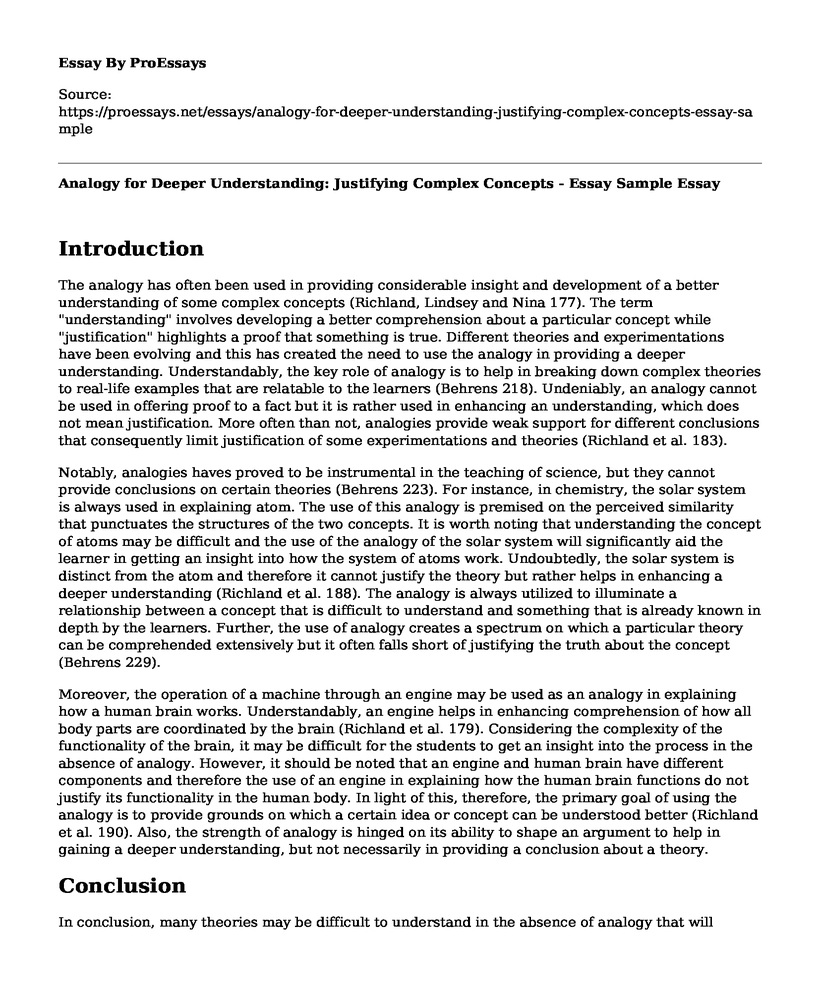Introduction
The analogy has often been used in providing considerable insight and development of a better understanding of some complex concepts (Richland, Lindsey and Nina 177). The term "understanding" involves developing a better comprehension about a particular concept while "justification" highlights a proof that something is true. Different theories and experimentations have been evolving and this has created the need to use the analogy in providing a deeper understanding. Understandably, the key role of analogy is to help in breaking down complex theories to real-life examples that are relatable to the learners (Behrens 218). Undeniably, an analogy cannot be used in offering proof to a fact but it is rather used in enhancing an understanding, which does not mean justification. More often than not, analogies provide weak support for different conclusions that consequently limit justification of some experimentations and theories (Richland et al. 183).
Notably, analogies haves proved to be instrumental in the teaching of science, but they cannot provide conclusions on certain theories (Behrens 223). For instance, in chemistry, the solar system is always used in explaining atom. The use of this analogy is premised on the perceived similarity that punctuates the structures of the two concepts. It is worth noting that understanding the concept of atoms may be difficult and the use of the analogy of the solar system will significantly aid the learner in getting an insight into how the system of atoms work. Undoubtedly, the solar system is distinct from the atom and therefore it cannot justify the theory but rather helps in enhancing a deeper understanding (Richland et al. 188). The analogy is always utilized to illuminate a relationship between a concept that is difficult to understand and something that is already known in depth by the learners. Further, the use of analogy creates a spectrum on which a particular theory can be comprehended extensively but it often falls short of justifying the truth about the concept (Behrens 229).
Moreover, the operation of a machine through an engine may be used as an analogy in explaining how a human brain works. Understandably, an engine helps in enhancing comprehension of how all body parts are coordinated by the brain (Richland et al. 179). Considering the complexity of the functionality of the brain, it may be difficult for the students to get an insight into the process in the absence of analogy. However, it should be noted that an engine and human brain have different components and therefore the use of an engine in explaining how the human brain functions do not justify its functionality in the human body. In light of this, therefore, the primary goal of using the analogy is to provide grounds on which a certain idea or concept can be understood better (Richland et al. 190). Also, the strength of analogy is hinged on its ability to shape an argument to help in gaining a deeper understanding, but not necessarily in providing a conclusion about a theory.
Conclusion
In conclusion, many theories may be difficult to understand in the absence of analogy that will create much-needed visualization and comprehension of some of their details. However, they may not justify the theories as the analogical reasoning cannot be used in giving conclusions about certain facts. Additionally, the analogy may be critical in enhancing communication to the learners would not otherwise gain better comprehension about a new concept. Further, analogy aids in expanding knowledge and promoting relational learning that is integral in improving understanding. Therefore, analogical arguments are often widely used in increasing understanding of complex theories but quite evidently, they cannot be utilized in drawing conclusions that will justify a theory.
Works Cited
Behrens, Heike. "The role of analogy in language processing and acquisition." The changing English language: Psycholinguistic perspectives (2017): 215-239. https://books.google.co.ke/books?hl=en&lr=&id=Lb4pDwAAQBAJ&oi=fnd&pg=PA215&dq
Richland, Lindsey Engle, and Nina Simms. "Analogy, higher order thinking, and education." Wiley Interdisciplinary Reviews: Cognitive Science 6.2 (2015): 177-192. https://onlinelibrary.wiley.com/doi/abs/10.1002/wcs.1336
Cite this page
Analogy for Deeper Understanding: Justifying Complex Concepts - Essay Sample. (2023, Mar 30). Retrieved from https://proessays.net/essays/analogy-for-deeper-understanding-justifying-complex-concepts-essay-sample
If you are the original author of this essay and no longer wish to have it published on the ProEssays website, please click below to request its removal:
- Research Proposal Example: Effects of Study Abroad and Its Contribution to Intercultural Competence
- How Historians Have Interpreted the Speech Essay
- Response Essay: English as a Second Language (ESL)
- The Austroasiatics in Ancient South China: Some Lexical Evidence Paper Example
- Leadership Experience as a High School Basketball Leader Paper Example
- Perception of Students on Group and Individual Work - Essay Sample
- Human Behavior for Risk Management - Report Example







